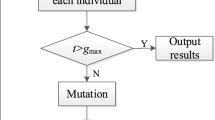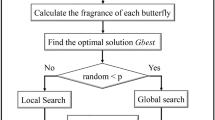Abstract
The purpose of influence maximization in social networks is to find K nodes as the spread source to activate as many nodes as possible. To improve the efficiency and effectiveness of the classic genetic algorithm in large social networks, the diffusion evaluation function is first proposed to estimate the impact range of seed nodes. Then the individuals are initialized based on the diffusion degree centrality of the node. Adapted a crossover strategy is used to help the evolution algorithm to achieve the purpose of local search. Besides, a direction vector is designed to guide the individual’s mutation. Through experiments on real social networks, the improved evolution algorithm can approximate the state-of-the-art greedy algorithm in the final result while also significantly improving time efficiency.
Access this chapter
Tax calculation will be finalised at checkout
Purchases are for personal use only
Similar content being viewed by others
References
Bhattacharya, S., Gaurav, K., Ghosh, S.: Viral marketing on social networks: an epidemiological perspective. Physica A 525, 478–490 (2019)
Ding, L., Ping, H., Guan, Zhi-Hong., Li, T.: An efficient hybrid control strategy for restraining rumor spreading. IEEE Trans. Syst. Man Cybernet.: Syst. (2020). https://doi.org/10.1109/TSMC.2019.2963418
Askarizadeh, M., Ladani, B., Manshaei, M.: An evolutionary game model for analysis of rumor propagation and control in social networks. Physica A 523, 21–39 (2019). https://doi.org/10.1016/j.physa.2019.01.147
Yuan, F., He, X., Karatzoglou, A., Zhang, L.: Parameter-efficient transfer from sequential behaviors for user modeling and recommendation. In: Proceedings of the 43rd Internat-ional ACM SIGIR Conference on Research and Development in Information Retrieval, pp. 1469–1478 (2020)
Ye, M., Liu, X., Lee, W-C.: Exploring social influence for recommendation: a generative model approach. In: Proceedings of the 35th international ACM SIGIR Conference on Research and Development in Information Retrieval, pp. 671–680 (2012)
Husein, I., Noerjoedianto, D., Sakti, M., Jabbar, A.H.: Modeling of epidemic transmission and predicting the spread of infectious disease. Syst. Rev. Pharmacy 11 (2020)
Domingos, P., Richardson, M.: Mining the network value of customers. In: Proceedings of the Seventh ACM SIGKDD International Conference on Knowledge Discovery and Data Mining, pp. 57–66 (2001)
Richardson, M., Domingos, P.: Mining knowledge-sharing sites for viral marketing. In: Proceedings of the Eighth ACM SIGKDD International Conference on Knowledge Discovery and Data Mining, pp. 61–70 (2002)
Kempe, D., Kleinberg, J., Tardos, É.: Maximizing the spreadof influence through a social network. In: Proceedings of the Ninth ACM SIGKDD International Conference on Knowledge Discovery and Data Mining, pp. 137–146 (2003)
Kempe, D., Kleinberg, J., Tardos, Éva.: Influential nodes in a diffusion model for social networks. In: Caires, Luís., Italiano, Giuseppe F., Monteiro, Luís., Palamidessi, Catuscia, Yung, Moti (eds.) ICALP 2005. LNCS, vol. 3580, pp. 1127–1138. Springer, Heidelberg (2005). https://doi.org/10.1007/11523468_91
Leskovec, J., Krause, A., Guestrin, C., Faloutsos, C., VanBriesen, J., Glance, N.: Cost-effective outbreak detection in networks. In: Proceedings of the 13th ACM SIGKDD International Conference on Knowledge Discovery and Data Mining, pp. 420–429 (2007)
Goyal, A., Lu, W., Lakshmanan, L.V.: Celf++ optimizing thegreedy algorithm for influence maximization in social networks. In: Proceedings of the 20th International Conference Companion on World Wide Web, pp. 47–48 (2011)
Kundu, S., Murthy, C.A., Pal, S.K.: A new centrality measure for influence maximization in social networks. In: Kuznetsov, S.O., Mandal, D.P., Kundu, M.K., Pal, S.K. (eds.) PReMI 2011. LNCS, vol. 6744, pp. 242–247. Springer, Heidelberg (2011). https://doi.org/10.1007/978-3-642-21786-9_40
Chen, S., He, K.: Influence maximization on signed social networks with integrated pagerank. In: 2015 IEEE International Conferenceon Smart City/SocialCom/ SustainCom (SmartCity). IEEE, pp. 289–292 (2015)
Yin, X., Hu, X., Chen, Y., Yuan, X., Li, B.: Signed-PageRank: an efficient influence maximization framework for signed social networks. IEEE Trans. Knowl. Data Eng. (2019). https://doi.org/10.1109/TKDE.2019.2947421
Wang, Y., Cong, G., Song, G., Xie, K.: Community-based greedy algorithm for mining top-k influential nodes in mobile social networks. In: Proceedings of the 16th ACM SIGKDD International Conference on Knowledge Discovery and Data Mining, pp. 1039–1048 (2010)
Shang, J., Zhou, S., Li, X., Liu, L., Wu, H.: CoFIM: a community-based framework for influence maximization on large-scale networks. Knowl.-Based Syst. 117, 88–100 (2017)
Jiang, Q., Song, G., Gao, C., Wang, Y., Si, W., Xie, K.: Simulated annealing based influence maximization in social networks. In: Proceedings of the AAAI Conference on Artificial Intelligence (2011)
Bucur, D., Iacca, G.: Influence maximization in social networks with genetic algorithms. In: Squillero, G., Burelli, P. (eds.) EvoApplications 2016. LNCS, vol. 9597, pp. 379–392. Springer, Cham (2016). https://doi.org/10.1007/978-3-319-31204-0_25
Gong, M., Yan, J., Shen, B., Ma, L., Cai, Q.: Influence maximization in social networks based on discrete particle swarm optimization. Inf. Sci. 367, 600–614 (2016)
Christakis, N.A., Fowler, J.H.: Connected: The Surprising Power of Our Social Networks and How They Shape Our Lives. Little, Brown Spark (2009)
Author information
Authors and Affiliations
Editor information
Editors and Affiliations
Rights and permissions
Copyright information
© 2021 Springer Nature Switzerland AG
About this paper
Cite this paper
Tang, X., Liu, X. (2021). Improved Evolution Algorithm that Guides the Direction of Individual Mutation for Influence Maximization in Social Networks. In: Qiu, H., Zhang, C., Fei, Z., Qiu, M., Kung, SY. (eds) Knowledge Science, Engineering and Management. KSEM 2021. Lecture Notes in Computer Science(), vol 12817. Springer, Cham. https://doi.org/10.1007/978-3-030-82153-1_44
Download citation
DOI: https://doi.org/10.1007/978-3-030-82153-1_44
Published:
Publisher Name: Springer, Cham
Print ISBN: 978-3-030-82152-4
Online ISBN: 978-3-030-82153-1
eBook Packages: Computer ScienceComputer Science (R0)




